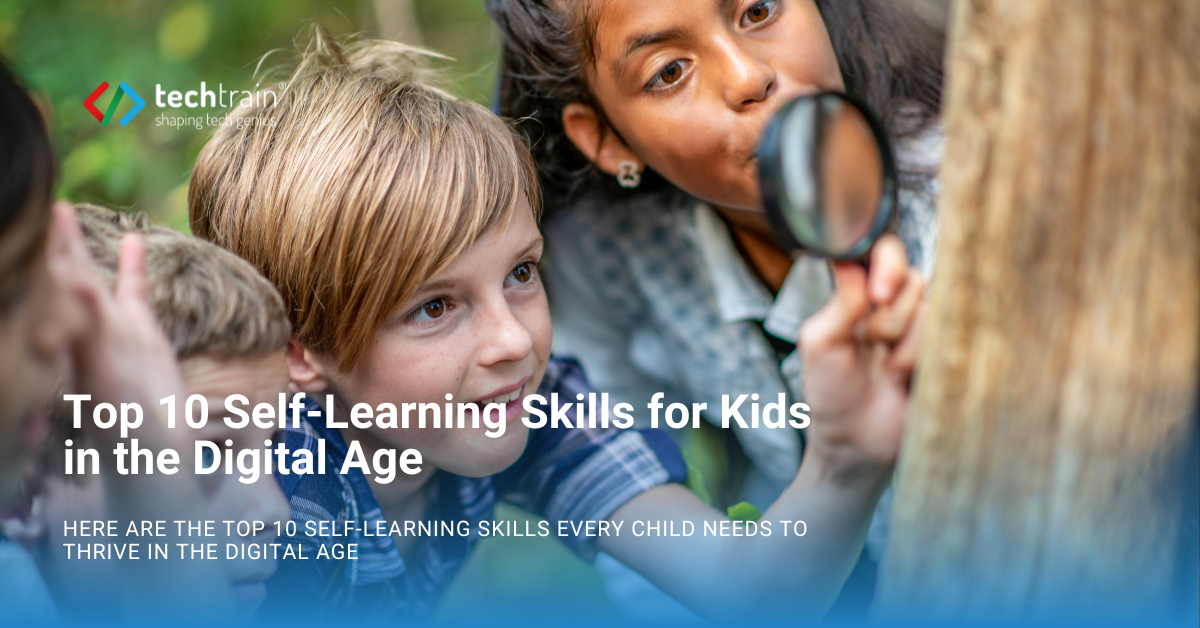The world of online learning for kids is booming. Global growth for K-12 online education is projected to be immense over the next four years, especially in large markets like China, far exceeding earlier estimates. Our children are already using digital tools to play, connect, and learn in a world that creates around 200,000 quintillion bytes every single day.
In this digital flood, simply completing online assignments isn't enough. The real challenge is learning how to navigate this sea of information safely and effectively. This is where self-learning becomes essential. It’s the internal drive that empowers children to not just find answers, but to ask the right questions, think critically, and take ownership of their own educational journey.
Here are the top 10 self-learning skills every child needs to thrive in the digital age.
1. Curiosity: The Drive to Ask "Why?"
Curiosity is the engine of self-learning. It’s the natural desire to explore, question, and understand the world. A curious child doesn't just accept facts; they want to know the "why" and "how" behind them. This is the foundational skill that fuels all other learning. As the Greek historian Plutarch said, "The mind is not a vessel to be filled, but a fire to be kindled." Curiosity is the spark that lights that fire. It transforms learning from a passive chore into an active adventure.
How to nurture it:
- When your child asks a question, resist the urge to give them the answer immediately. Instead, ask, "That's a great question! How could we find out together?
- Create a "wonder wall" or a "question jar" at home where they can write down things they're curious about.
- Explore their interests with them. If they're fascinated by dinosaurs, find documentaries, visit a museum, or get books from the library to fuel that passion.
2. Problem-Solving: The Art of Finding Solutions
Problem-solving is more than a skill; it's a mindset. It teaches children to view challenges not as frustrating roadblocks, but as interesting puzzles waiting to be solved. When a child learns to approach a problem with curiosity instead of fear, their first thought shifts from "I can't do this" to "How can I figure this out?" This shift is fundamental to building the confidence and resilience they'll need throughout their lives.
Problem-solving is the ability to face a challenge, analyze it, and come up with a plan to overcome it. In the digital age, this often involves a mix of creative thinking and technical know-how. Whether it's fixing a bug in a line of code or figuring out a tough math problem, this is one of the most critical self-learning skills.
How to nurture it: Encourage your child to tackle small, age-appropriate challenges. This could be anything from building a LEGO structure without instructions to figuring out why a game on their tablet isn't working.

3. Critical Thinking: Learning to Think, Not Just Memorize
Similar to problem-solving, critical thinking is a mindset, not just a skill. It's about teaching children to be active investigators of information, not just passive consumers. In a world full of content, this mindset encourages them to pause and ask, "Does this make sense?" instead of blindly accepting what they see or hear. This habit of questioning is the foundation of becoming a discerning, well-informed individual who can form their own opinions based on evidence.
How to nurture it: When you read an article or watch a video online with your child, ask questions like, "Who made this?" and "How do they know this information is true?"
4. Digital Literacy: Navigating the Online World Safely
The online world is a playground of endless information, but it's not without its dangers. With studies from the UN showing that over a third of young people report being cyberbullied, and other research revealing that 57% of kids have seen real, disturbing violence online, digital literacy is no longer optional. More than just knowing how to use a computer, it's about understanding how to use digital tools effectively, ethically, and safely. This is a key component of online learning for kids, as it empowers them to use the internet as a powerful learning resource while protecting themselves.
How to nurture it:
- Set clear rules for online safety and screen time.
- Have open, ongoing conversations about what to do if they encounter something that makes them feel uncomfortable.
- Teach them the simple rule: "If you see something weird, tell a trusted adult immediately."
5. Time Management: Taking Charge of Their Schedule
Empowering your child to manage their own time is one of the greatest gifts you can give them for their future success. Time management is the ability to plan and control how you spend your time on specific activities. For kids engaged in online learning, this means knowing how to balance screen time with other responsibilities. It’s a skill that builds discipline and focus.
How to nurture it:
- Use the "Pomodoro Technique": Have your child work on a task for a focused 25-minute block, followed by a 5-minute break. This makes big tasks feel less overwhelming.
- Create a "First/Then" Board: For younger kids, a simple visual chart showing "First we do homework, then we play a game" can provide structure and motivation.
- Give Them Ownership: Use a visual timer or a simple calendar to help your child plan their day. Give them ownership over their schedule for small blocks of time.

6. Resilience: Bouncing Back from Mistakes
There's an old saying that the younger a tree is, the more easily it bends without breaking. The same is true for resilience in children. The earlier they learn to recover from setbacks and keep trying, the stronger and more adaptable they will become. In self-learning, mistakes are not failures; they are learning opportunities. A resilient child understands that it’s okay to not know something and that effort is the path to mastery.
How to nurture it: Praise your child's effort, not just the outcome. Say things like, "I love how you kept trying even when it was hard."
7. Creativity: Thinking Outside the Box
When a child looks at the same set of LEGO bricks as everyone else and builds something entirely unique, that's creativity. It isn't just about being good at art; it's about connecting ideas in new ways. In the digital age, creativity is the spark that turns a user of technology into an inventor with technology.
How to nurture it: Provide your child with open-ended creative tools, both digital and physical. Encourage them to experiment without worrying about making it "perfect."
8. Communication: Sharing What They've Learned
Knowledge gains its true power when it's shared. The act of explaining a concept to someone else is one of the best ways to truly understand it. Communication is the skill that turns a self-learner into a teacher and a leader. It solidifies their own understanding by forcing them to organize their thoughts, and it allows them to inspire and collaborate with others, transforming individual learning into community knowledge.
How to nurture it: The best way to show you value their learning is to become their first student. Ask your child to teach you something they learned online, and give them your full attention. Encourage them to create a short "how-to" video, draw a diagram, or simply explain it at the dinner table. This simple act of listening validates their effort and shows them that their knowledge is important.
9. Information Seeking: Knowing How to Find Answers
If curiosity is the engine, information seeking is the steering wheel. It's the practical skill of navigating the vast world of information to find what you need. This isn't just about "Googling it"; it's about learning how to ask the right questions, compare different sources, and identify trustworthy guides on the journey to an answer. A child who can find reliable information can learn anything they set their mind to.
How to nurture it: Turn their questions into "research projects." If they want to know how volcanoes work, guide them to find kid-friendly videos, articles from science websites, and even online museum exhibits. Teach them to ask, "Who made this website?" to start thinking about sources.
10. Adaptability: Embracing Change
In a world where the only constant is change, adaptability is the ultimate survival skill. It's the ability to unlearn old methods and embrace new ones with enthusiasm rather than fear. For a child, this means being comfortable with the idea that the app they love today might be different tomorrow, and that's an opportunity, not a problem.
How to nurture it: Introduce your child to new apps, websites, and learning platforms. Frame it as an exciting adventure to explore something new together.
Give Your Child the Tools to Succeed
Nurturing these self-learning skills at home will prepare your child for a future where they can confidently take charge of their own education. By encouraging curiosity, resilience, and critical thinking, you are giving them the greatest gift of all: the ability to learn anything.
Ready to give your child a head start in building these essential skills in a fun, supportive environment? At TechTrain, we design our programs to foster creativity, problem-solving, and a love for learning. Explore our courses today and see how we can help your child capture their genius!
.avif)

.avif)


.avif)












.avif)
.avif)

.avif)
.avif)
.avif)
.avif)



.png)
